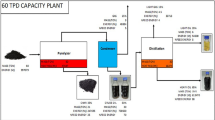Abstract
The use of conventional coolants at the machining of metals causes different environmental problems. Besides plant seed oil, animal fat and used cooking oil proved to be other possible raw material sources for alternative ester based coolants. In this paper their properties are compared with those of mineral oil and plant seed oil ester products regarding technical, economical and ecological aspects from a life cycle perspective. In this context grinding tests, Life Cycle Assessment and Life Cycle Costing were performed. The three disciplines are brought together in a material flow model and therefore results are well harmonized.
Access this chapter
Tax calculation will be finalised at checkout
Purchases are for personal use only
Preview
Unable to display preview. Download preview PDF.
Similar content being viewed by others
8 References
Herrmann, C., Mansour, M.; Mateika, M., 2005, Strategic an operational life cycle management — models, methods and activities, in 12th International CIRP Life Cycle Management Seminar, Grenoble, France.
Dettmer, T., 2006, Nichtwassermischbare Kühlschmierstoffe auf Basis nachwachsender Rohstoffe, Vulkan-Verlag, Essen, Germany.
Verband Fleischmehlindustrie e.V., 2005, Überblick — Zahlen, http://www.fleischmehlindustrie.de/fakten_zahlen.php.
Bock, R., 1996, Umwelt-und arbeitsverträgliche Kühlschmierstoffe für die spanende Bearbeitung von Metallen mit geometrisch unbestimmter Schneide, Vulkan-Verlag, Essen, Germany.
Deutsches Lebensmittelbuch, 2001, Leitsätze für Speiseöle und Speisefette, Germany.
Falk, O., 2004, Entwicklung von oxidationsstabilen Schmierstoffgrundölen auf Basis von Monoalkylestern aus Altspeise-und Tierfetten, Dissertation, TU München, Germany.
DIN ISO 14040ff, 1998, Umweltmanagement-Ökobilanzen-Festlegung des Ziels und des Untersuchungsrahmens sowie Sachbilanz (dt. und engl.), Berlin, Deutschland.
VDI (ed.), 1997, Richtlinie VDI 4600-Kumulierter Energieaufwand-Begriffe, Definitionen, Berechnungsmethoden, Deutschland.
Author information
Authors and Affiliations
Editor information
Editors and Affiliations
Rights and permissions
Copyright information
© 2007 Springer-Verlag London Limited
About this paper
Cite this paper
Herrmann, C., Hesselbach, J., Bock, R., Dettmer, T. (2007). Coolants made of native ester — technical, ecological and cost assessment from a life cycle perspective. In: Takata, S., Umeda, Y. (eds) Advances in Life Cycle Engineering for Sustainable Manufacturing Businesses. Springer, London. https://doi.org/10.1007/978-1-84628-935-4_52
Download citation
DOI: https://doi.org/10.1007/978-1-84628-935-4_52
Publisher Name: Springer, London
Print ISBN: 978-1-84628-934-7
Online ISBN: 978-1-84628-935-4
eBook Packages: EngineeringEngineering (R0)




